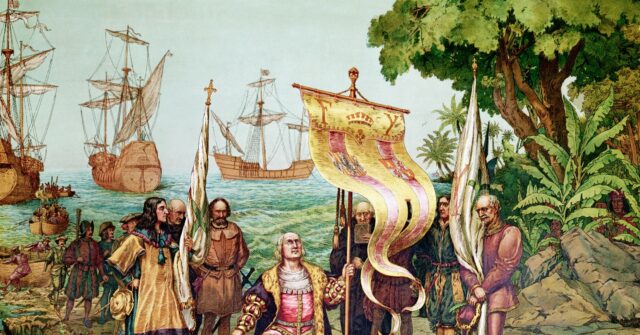Spanish researchers have claimed that DNA and other analyses indicate that Christopher Columbus likely came from a Jewish family in Spain.
The 15th-century man credited with the discovery of the Americas has been traditionally recognised as an Italian who hailed from the Republic of Genoa and who sailed under a Spanish flag, however, an investigation spanning over the past two decades led by University of Granada Professor Miguel Lorente Acosta claims to have undercut the origin story of the ‘Admiral of the Ocean Sea’.
The Spanish team asserted that analysis of the DNA from the bones of Christopher Columbus and his son, Hernando, buried in the Seville Cathedral, indicated that both men had “traits compatible with Jewish origins,” The Telegraph reports.
The DNA also showed a “western Mediterranean” origin, yet it was not conclusive as to which Mediterranean country the Columbus family came from.
Yet the findings, published in a primetime documentary in Spain on Saturday to coincide with the country’s national day, claimed that Columbus was almost certainly not originally from Italy.
In addition to the DNA evidence, Prof Lorente Acosta pointed to an analysis of around 40 letters signed by the explorer, which the researchers claimed showed no signs of influence by the Italian language. The team highlighted letters written to a bank in Genoa by Columbus which were still written in Castilian Spanish rather than Italian.
He argued, therefore, that Columbus probably hailed from either the Spanish Mediterranean or the Balearic Islands off the East Coast of the Iberian Peninsula.
“What do we have left? The Spanish Mediterranean arc, the Balearic Islands and Sicily. But Sicily would also be strange, because if so, Christopher Columbus would have written with some Italian or Sicilian features. So it is most likely that his origin is in the Spanish Mediterranean arc or in the Balearic Islands”, the forensic scientist said.
Spanish historian Francesc Albardaner, who has long argued that Columbus came from the Catalan region of eastern Spain, said that his research points to the explorer coming from a family of Jewish silk spinners from the Valencia region of Spain.
“Jews could only spend three days at a time in Genoa by law at that time,” Mr Albardaner noted. The historian said that around 200,000 Jewish people were living in Spain during the time of Columbus, while there were only around between 10,000 and 15,000 living in Italy.
Albardaner argued that Columbus likely chose to obscure his heritage and faith to avoid religious persecution against Jews common in Europe at the time, including during the Spanish Inquisition.
The era saw the forced conversion of Jews to Christianity and an order of expulsion of those who refused to convert in 1492, the same year Columbus set sail from Spain on the voyage that would result in his discovery of the New World, earlier discoveries by Viking Leif Erikson that failed to create a broader awareness of the presence of the Americas notwithstanding.
“Christopher Columbus had to pretend all his life that he was a Roman Catholic Christian. If he had made one mistake, this man would have ended up on the pyre,” Mr Albardaner said, potentially undercutting modern leftist narratives branding the explorer as a figure of colonial oppression.
There have long been suggestions that Columbus was Jewish. Professor of Jewish Studies and History at Pennsylvania State University Tobias Brinkmann has noted that traditionally Jewish given names, such as Abraham and Jacob, were common among members of his maternal line. Brinkmann also pointed to the familial profession of the Columbus family as evidence, with weaving being associated with Jews in Spain at the time.
Columbus is also said to have selected many Jews as well as those who were forced to convert to Christianity, known as “conversos”, to staff his crew as astrologers, navigators, and translators. Others have even speculated that the true purpose of his explorations may have been motivated by a desire to find a new land for Jewish people to settle in free from persecution.
Follow Kurt Zindulka on X: Follow @KurtZindulka or e-mail to: [email protected]
Read the full article here
